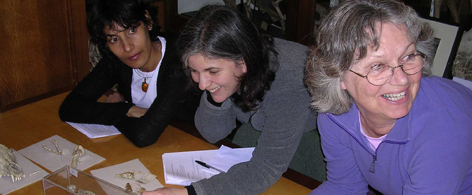Object Based Learning in Higher Education
Dr. Helen Chatterjee, Deputy Director of UCL Museums Collections and Director of Studies for Biological Sciences, School of Life and Medical Sciences.
h.chatterjee@ucl.ac.uk
Dr. Rosalind Duhs, Senior Teaching Fellow, UCL Centre for the Advancement of Learning and Teaching.
r.duhs@ucl.ac.uk
Conference themes addressed:
- The role of museums in supporting HE student learning
- The educational philosophies and theories that underpin learning and research in museums and HE
Keywords:
Museum Learning, Object Based Learning, Higher Education, Active Learning, Key Skills
________________
University museums were pioneers in object based learning; many universities amassed substantial collections across the arts, humanities, sciences and medicine, primarily for the purpose of teaching. These collections afford a valuable opportunity to provide a focal point for acquiring subject-specific knowledge. Objects can also be used to inspire discussion, group/team work and lateral thinking – all essential key, transferable, skills in higher education (Chatterjee, 2009). Object based learning in higher education draws on many of the learning strategies already known to inform students, including active learning and experiential learning.
This paper presents research in the form of case studies of initiatives undertaken by UCL Museums & Collections. The studies explore the value of object based learning and focus on the student perspective (Chatterjee and Noble, 2009). Practice-led examples from a range of disciplines are provided and the pedagogical framework for museum learning in the university classroom is illuminated through an analysis of how museum artefacts help students to learn.
The disciplines studied are medicine, biology, geology, archaeology and museum studies. The potential of object based learning to promote student engagement and understanding is illustrated. The presentation of the paper will include podcasts of object based learning taking place at UCL. These will be available on the UCL website.
It appears to be easier to learn about complex and challenging areas of knowledge, ‘troublesome knowledge’ (Meyer & Land, 2005) when several senses are involved in active learning (Biggs, 2003; Prince, 2004). The experience of seeing and touching objects and discussing them with peers leads students to interpret the concrete and relate it to abstract concepts (Paris, 2002). The process of learning is valuable in itself, as verbal communication and presentation skills as well as writing can be developed. Student learning can also be assessed through tasks based on objects, real or virtual.
The paper conveys the excitement of learning through museum collections. As little research has been done in this field, we hope our case studies will prompt further work on object based learning in higher education.
References
Biggs, J. (2003). Teaching for Quality Learning at University (2 ed.). Buckingham: The Society for Research into Higher Education & Open University Press.
Chatterjee, H. J. (2009). Staying Essential: Articulating the Value of Object Based Learning. University Museums and Collections Journal. Published online: 15/01/2009 http://edoc.hu-berlin.de/umacj
Chatterjee, H. J. & Noble, G. (2009). Object Therapy: A Student-selected Component Exploring the Potential of Museum Object Handling as an Enrichment Activity for Patients in Hospital. Global Journal of Health Sciences, 1(2), 42-49.
Meyer, J. H. F., & Land, R. (2005). Threshold Concepts and Troublesome Knowledge (2): Epistemological Considerations and a Conceptual Framework for Teaching and Learning. Higher Education, 49(3).
Paris, S. G. (2002). Perspectives on Object-Centered Learning in Museums. Mahwah NJ: Lawrence Erlbaum Associates.
Prince, M. (2004). Does Active Learning Work? A Review of the Research. Journal of Engineering Education, 93(3), 223-231.
Click for pdf download of the full paper 'Object Based Learning in Higher Education'
